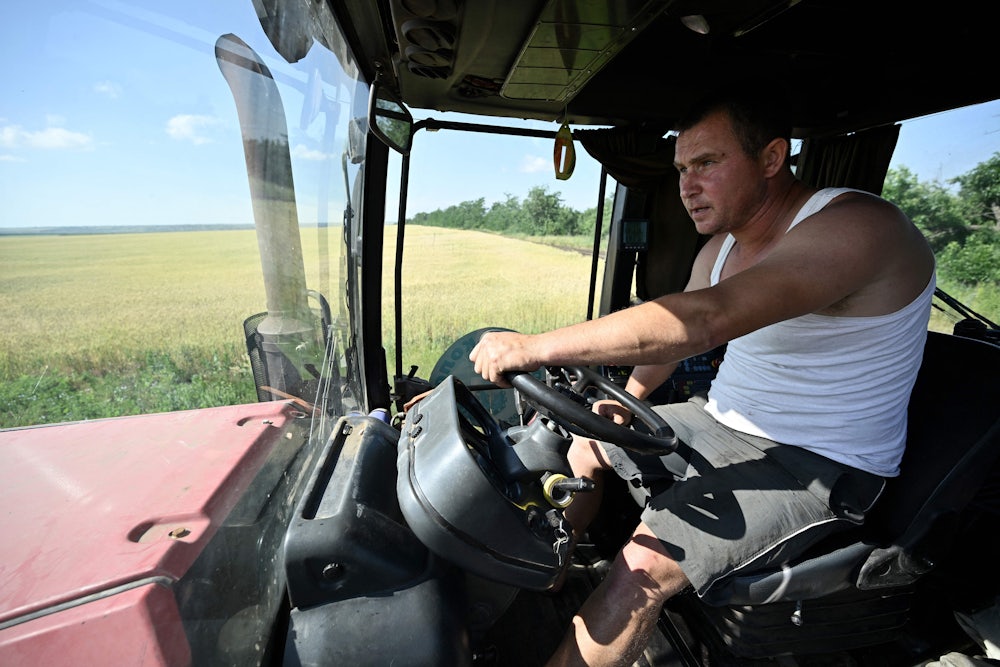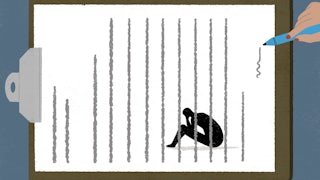The United Nations World Food Programme has called 2022 a “year of unprecedented hunger.” The war in Ukraine, climate disaster, and Covid-19 have destroyed crops, disrupted supply chains, and increased fuel and fertilizer costs. That’s left 50 million people “teetering on the edge of famine.”
Alarming headlines may lead some to believe that we’re experiencing an acute scarcity of food, but the problem is less about the total amount of consumable food produced worldwide. Instead, the leading cause of hunger for over 800 million people today is affordability and access. As the world faces its third global food crisis in 15 years, some experts warn that policymakers have failed to learn from past troubles and may be making conditions worse in the long run.
Food systems researchers and human rights advocates argue that the industrial agricultural system has left developing nations and the world’s poor vulnerable to localized disruptions that erupt into global price shocks. Those fighting for justice in the food system say it’s time for wealthy nations to eliminate financial burdens like sovereign debt and corporate subsidies, with the ultimate aim of transitioning to sustainable farming practices that prioritize feeding people over turning a profit.
“The food system exists out of a long history of colonialism and exploitation, and now a modern political ecology of debt, extreme weather, and dependency on imports caused precisely by the world’s richest countries,” said Raj Patel, a University of Texas at Austin research professor and author of Stuffed and Starved: The Hidden Battle for the World Food System.
The worst-case scenario, Patel notes, is already playing out in the Horn of Africa, where severe droughts have left 22 million people at risk of starvation. In September, the U.N. warned that “famine is at the door” in Somalia, where half of the country’s population needs food assistance. Prior to the war, Somalia relied on Russia and Ukraine for all of its wheat imports. While three-quarters of the country’s gross domestic product comes from the agricultural sector, 80 percent of exports are livestock and the majority of farmland is reserved for pasture.
Humanitarian aid won’t be enough to stop the poorest from suffering. Patel is joined by a growing number of international figures and organizations advocating for debt relief to low-income nations struggling with inflation and climate catastrophe. The list includes U.N. Secretary-General António Guterres, Amnesty International, Oxfam International, and the president of the Rockefeller Foundation.
Since the pandemic, inflation has gone up across the world, making it harder for developing nations to afford imports. At the same time, corporations saw record-setting profits as this economic turmoil provided a convenient excuse to jack prices up even further. Oxfam International calculated that food and energy billionaires saw their wealth grow by a billion dollars every two days, and the organization has called on the G7 to levy a windfall tax on the world’s largest corporations.
Agriculture’s integration into the global market has left import-dependent nations particularly vulnerable to market disruptions as nations in the global south turned more of their attention to industrial-scale cash crops for export. In a few decades, Africa went from being a net exporter of food to relying on imports for the majority of its calories.
At the same time, acute consolidation in the industry has seen just four companies take control of the global grain and agrochemical markets, which has meant increased fragility to external shocks, including conflict, Covid, climate change, and greater risk of commodity speculation and profiteering.
Putin’s weaponization of grain and fertilizer production has underscored the vulnerabilities of the industrial agriculture system. With Russia and Ukraine representing more than a quarter of the world’s wheat supply and 12 percent of globally traded calories, import-dependent nations face the dual threats of mass starvation and political destabilization. Ukrainian grain exports have only recently approached prewar levels after plummeting to 15 to 20 percent this summer. An escalation in Russian aggression could very well see another crash.
“The paradox of the situation is that the big farmers stopped immediately,” says Szocs-Boruss Miklos Attila, a small farmer in Romania and president of Eco Ruralis, a grassroots peasant association. “They suffered a huge shock because of their concentration, because of the lack of inputs” like chemicals and fertilizers. Szocs-Boruss says the small farmers in Ukraine, for whom leaving wasn’t an option, were faced with either joining the resistance or demining the fields and continuing to harvest. “When you’re a farmer [who] is not producing food for yourself first and then for the global market, it’s easy to ditch.”
Mainstream policymaking circles have focused on technology, trade, and higher crop yields. Price shocks, the thinking goes, are not the result of an inherently volatile global supply chain so much as standalone disruptions to trade. When a crisis hits, the response has been to keep trade and food aid flowing while leaving the system intact.
Emily Mattheisen, a program director at FIAN International, a nonprofit that advocates for the right to adequate food and nutrition, says it’s impossible to satisfy these rights under a food system where both production and public policymaking are dominated by corporate monopolies. “Just feeding people as the solution to hunger and malnutrition is not a long-term solution,” says Mattheisen. “It’s looking at the structures of the food system which are causing inequities in the first place, which is not happening to a large extent.”
In May, FIAN International and the International Panel of Experts on Sustainable Food Systems both released exhaustive reports on the systemic issues such as corporate consolidation, commodity speculation, and grain hoarding that turn disruptions in one part of the supply chain into full-scale price shocks. Both urge the international community to take the lead from those most impacted by hunger and point to the U.N.’s Committee on World Food Security as an inclusive platform to hear from both civil society and Indigenous peoples.
Climate change is high on the list of concerns, and industrial agriculture, which is energy-intensive and relies heavily on fossil fuel-based fertilizers, appears only to be making things worse. Each year, about 30 percent of global emissions come from food production and roughly one-third of all food produced goes to waste (in high-income nations, waste is more common among consumers, and in low-income nations waste often occurs during or after harvest). Despite this abundance, there are sustained calls to expand access to fertilizers to increase crop yields—not to boost growth of food that would feed local residents but rather to reinforce monocropping for export markets.
In light of Russia’s assault on Ukraine, small and medium-scale farmers in Europe have underscored the importance of rebuilding food systems from the bottom up to prioritize local supply chains, biodiversity, and sustainability for the long-term—reforms that they say are more resilient against external shocks.
Mattheisen says too much focus has been placed on “food security” over the “right to food.” Patel sums up the difference between the two by saying, “You can be food secure in prison. You can have access to food, but have no power over the system that produces it.” He adds that “there are ways countries can and should move away from the colonial supply chains that exist.… There’s a reckoning to be had here.”
Under British colonial rule, millions of people were systematically starved in Bengal as inflationary wartime policies became devastating famines. In Late Victorian Holocausts, Mike Davis concluded that somewhere between 30 to 60 million people were killed by famine as a result of colonial policies. Decades later, Western nations would again play a central role in reshaping food in the global south through structural adjustment programs. As a condition of borrowing money from international financial institutions like the IMF and World Bank, recipient nations eliminated domestic subsidies, opened agricultural markets to global trade, and displaced small farmers to make room for export crops.
In Barbados, Prime Minister Mia Mottley has led the charge in targeting the global financial system as a means of fighting natural disasters and resource inequities between the northern and southern hemispheres. Others have called on wealthy nations to redirect billions of dollars in agricultural subsidies, which overwhelmingly benefit corporate meat and dairy monopolies, to rebuild a diverse food system that is more attuned to local diets. These subsidies have also made it nearly impossible for small farmers to compete in a “free-market system” that has been rigged against them. “There are hardly any policies set up at the European level and the global level that, right now, support small farmers,” says Szocs-Boruss. “Most of its being done by either international donors like USAID or charity organizations.”
While the war’s ripple effects are still being felt in the food system throughout the world, Szocs-Boruss believes it’s more important than ever for people to demand a fairer and more localized food system, starting with the small farmers in Ukraine who are holding the front line. “The small farmers became the backbone of food autonomy in Ukraine in times of crisis,” says Szocs-Boruss. “That’s where more of the attention should have gone, but it didn’t. It went to support this global food system.”


